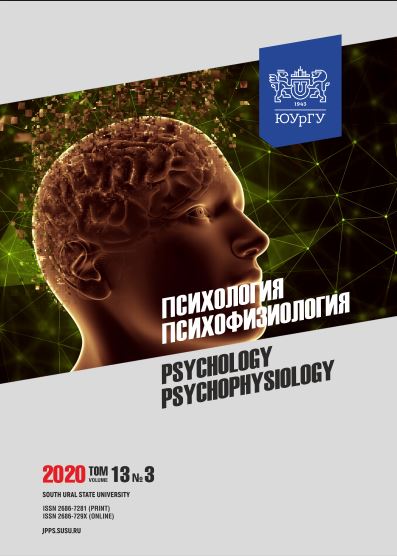SOCIOMETRIC CHARACTERISTICS OF THE EFFECTIVENESS OF TEAM INTERACTION OF INDIVIDUALS WITH DIFFERENT EXPRESSION OF A FIELD-DEPENDENT COGNITIVE STYLE
Abstract
Background: The effectiveness of team interaction is often assessed through sociometric indicators, namely sociometric status and emotional reciprocity. At the same time, interpersonal interaction is a cognitive process, since it includes such mental processes as perception, categorization, thinking, speech, etc., which serve for information processing. These individual differences in the way information is processed underlie the concept of cognitive styles. Therefore, cognitive styles can hypothetically be considered as characteristics of interpersonal interaction and a predictor of its effectiveness. Aim: The paper aims to determine the sociometric characteristics of the effectiveness of team interaction of persons with different degree of the field-dependent cognitive style. Materials and methods. To assess field-dependence/field-independence, the Gottschaldt Embedded Figures method was used. The effectiveness of team interaction was assessed using the Moreno small group study method. Statistical analysis was performed with the Mann-Whitney test using IBM SPSS Statistics 23. Results. It was found that persons with a mobile field-dependent cognitive style had a significantly higher hierarchical position and a stable position in the system of nterpersonal relations compared with persons with a polar field-dependent cognitive style. Evidence was obtained on the splitting of field dependence into polar field-dependent and mobile field-dependent styles. Conclusion. Field-dependence/field-independence can be considered as one of the basic inner qualities of a person's intellectual activity, which influences his/her behavior and interpersonal communication.
Downloads
References
2. Moreno Ya.L. Sotsiometriya: Eksperimentalnyi metod i nauka ob obshchestve [Sociometry: Experimental method and science of society]. Moscow, Akadem. Project; Kirov, Vyatka, 2004. 315 p. (in Russ.).
3. Piazhe J. Psikhologiya intellekta [Psychology of intelligence]. St. Petersburg: Piter, 2003. 192 p. (in Russ.).
4. Skotnikova I.G. Problemy subektnoi psikhofiziki [Problems of subjective Psychophysics]. Ed. V.A. Barabanschikova. Moscow, Publ. house of IE RAS, 2008. 382 p. (in Russ.).
5. Fetiskin N.P., Kozlov V.V., Manuilov G.M. Sotsialno-psikhologicheskaya diagnostika razvitiya lichnosti i malykh grupp [Socio-psychological diagnostics of personality development and small groups]. Moscow. Publ. house of The Institute of Psychotherapy, 2002. 490 p. (in Russ.).
6. Kholodnaya M.A. Kognitivnye stili. O prirode individualnogo uma [Cognitive styles. On the nature of the individual mind]. St. Petersburg, Piter, 2004. 384 p. (in Russ.).
7. Shkuratova I.P. Kognitivnyi stil i obshchenie [Cognitive style and communication]. Rostov on Don, Publ. house of the Rostov pedagogical University, 1994. 156 p. (in Russ.).
8. Shoshina I.I., Shelepin Yu.E. Mekhanizmy globalnogo i lokalnogo analiza zritelnoi informatsii pri shizofrenii [Mechanisms of global and local analysis of visual information in schizophrenia]. St. Petersburg, VVM publ. House, 2016. 300 p. (in Russ.).
9. Witkin H.A., Oltman Ph.K., Raskin E., Karp S. A manual for the Embedded Figures Tests. Palo Alto, Calif. Consulting Psychol. Press, Inc., 1971.
10. Armstrong S.J., Cools E., Sadler-Smith E. Role of Cognitive Styles in Business and Management: Reviewing 40 Years of Research. International Journal of Management Reviews, 2011, vol. 14, pp. 238–262. DOI: 10.1111/j.1468-2370.2011.00315.x
11. Cunningham D.M., Ridley S.E., Cambell A. Performance of field-independent and dependent college students, and their “fixed” and “mobile” subtypes on two formats of cognitive task. Perc. and Motor Skills, 1988, vol. 66 (1), pp. 311–317.
12. Globerson T. Mental capacity, mental effort and cognitive style. Developmental review, 1983, vol. 3, pp. 292–302. DOI: 10.1016/0273-2297(83)90017-5
13. Kaplan E., Shapley R. The primate retina contains two types of ganglion cells, with high and
low contrast sensitivity. Proc. Natl. Acad. Sci. USA, 1986, vol. 83, pp. 2755–2757.
14. Kepner M.D., Neimark E.D. Test-retest reliability and differential patterns of score chance on the Group Embedded Figures Test. J. of Personality and Soc. Psychology, 1984, vol. 46 (6), pp. 1405–1413. DOI: 10.1037//0022-3514.46.6.1405
15. Livingstone M.S., Hubel D.H. Psychophysical evidence for separate channels for the perception of form color movement and depth. J. Neurosci, 1987, vol. 7, pp. 3416–3468. DOI: 10.1523/JNEUROSCI.07-11-03416.1987
16. Niaz M. Mobility-fixity dimension in Witkins theory of field-dependence/independence and its implication for problem solving in science. Perc. and Motor Skills, 1987, vol. 65 (3), pp. 755–764. DOI: 10.2466/pms.1987.65.3.755
17. Noppe L.D. The relationship of formal thought and cognitive styles to creativity. J. of Creative Behaviour, 1985, vol. 19 (2), pp. 88–96. DOI: 10.1002/j.2162-6057.1985.tb00641.x
18. Witkin H.A., Dyke R.B., Paterson H.F., Goodenough D.R., Karp S.A. Psychological differentiation. New York, Wiley, 1974. 418 р.
19. Shoshina I.I., Shelepin Yu.E. Effectiveness of Discrimination of the Sizes of Line Segments by Humans with Different Cognitive Style Parameters. Neuroscience and Behavioral Physiology, 2014, vol. 44, is. 7, pp. 748–753. DOI: 10.1007/s11055-014-9978-2
20. Witkin H.A., Goodenough D.R., Oltman P. Psychological differentiation: current status. J. of Personality and Soc. Psychology, 1979, vol. 37 (7), pp. 1127–1145.
References on translit
-Copyright (c) 2020 Psychology. Psychophysiology

This work is licensed under a Creative Commons Attribution-NonCommercial-NoDerivatives 4.0 International License.



